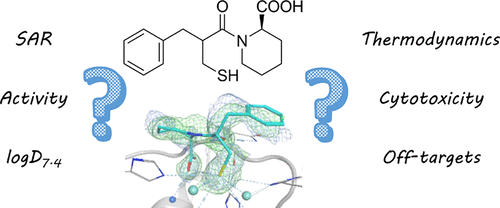当前位置:
X-MOL 学术
›
ACS Infect. Dis.
›
论文详情
Our official English website, www.x-mol.net, welcomes your feedback! (Note: you will need to create a separate account there.)
Challenges in the Development of a Thiol-Based Broad-Spectrum Inhibitor for Metallo-β-Lactamases
ACS Infectious Diseases ( IF 5.3 ) Pub Date : 2017-11-26 00:00:00 , DOI: 10.1021/acsinfecdis.7b00129 Dominik Büttner , Jan S. Kramer , Franca-M. Klingler , Sandra K. Wittmann , Markus R. Hartmann , Christian G. Kurz , Daniel Kohnhäuser , Lilia Weizel , Astrid Brüggerhoff , Denia Frank 1 , Dieter Steinhilber , Thomas A. Wichelhaus 1 , Denys Pogoryelov , Ewgenij Proschak
ACS Infectious Diseases ( IF 5.3 ) Pub Date : 2017-11-26 00:00:00 , DOI: 10.1021/acsinfecdis.7b00129 Dominik Büttner , Jan S. Kramer , Franca-M. Klingler , Sandra K. Wittmann , Markus R. Hartmann , Christian G. Kurz , Daniel Kohnhäuser , Lilia Weizel , Astrid Brüggerhoff , Denia Frank 1 , Dieter Steinhilber , Thomas A. Wichelhaus 1 , Denys Pogoryelov , Ewgenij Proschak
Affiliation

|
Pathogens, expressing metallo-β-lactamases (MBLs), become resistant against most β-lactam antibiotics. Besides the dragging search for new antibiotics, development of MBL inhibitors would be an alternative weapon against resistant bacterial pathogens. Inhibition of resistance enzymes could restore the antibacterial activity of β-lactams. Various approaches to MBL inhibitors are described; among others, the promising motif of a zinc coordinating thiol moiety is very popular. Nevertheless, since the first report of a thiol-based MBL inhibitor (thiomandelic acid) in 2001, no steps in development of thiol based MBL inhibitors were reported that go beyond clinical isolate testing. In this study, we report on the synthesis and biochemical characterization of thiol-based MBL inhibitors and highlight the challenges behind the development of thiol-based compounds, which exhibit good in vitro activity toward a broad spectrum of MBLs, selectivity against human off-targets, and reasonable activity against clinical isolates.
中文翻译:

基于硫醇的金属β-内酰胺酶的广谱抑制剂开发中的挑战
表达金属β-内酰胺酶(MBL)的病原体对大多数β-内酰胺类抗生素产生抗药性。除了寻找新抗生素的艰苦努力之外,MBL抑制剂的开发将是抵抗耐药细菌病原体的另一种武器。抑制抗性酶可以恢复β-内酰胺的抗菌活性。描述了MBL抑制剂的各种方法;参见下文。其中,锌配位硫醇部分的有前途的基序非常受欢迎。然而,自2001年首次报道基于硫醇的MBL抑制剂(硫代扁桃酸)以来,没有任何开发基于硫醇的MBL抑制剂的步骤超出临床分离试验的范围。在这项研究中,针对多种MBL的体外活性,针对人脱靶的选择性以及针对临床分离株的合理活性。
更新日期:2017-11-26
中文翻译:

基于硫醇的金属β-内酰胺酶的广谱抑制剂开发中的挑战
表达金属β-内酰胺酶(MBL)的病原体对大多数β-内酰胺类抗生素产生抗药性。除了寻找新抗生素的艰苦努力之外,MBL抑制剂的开发将是抵抗耐药细菌病原体的另一种武器。抑制抗性酶可以恢复β-内酰胺的抗菌活性。描述了MBL抑制剂的各种方法;参见下文。其中,锌配位硫醇部分的有前途的基序非常受欢迎。然而,自2001年首次报道基于硫醇的MBL抑制剂(硫代扁桃酸)以来,没有任何开发基于硫醇的MBL抑制剂的步骤超出临床分离试验的范围。在这项研究中,针对多种MBL的体外活性,针对人脱靶的选择性以及针对临床分离株的合理活性。



























 京公网安备 11010802027423号
京公网安备 11010802027423号